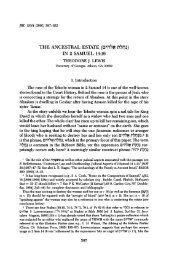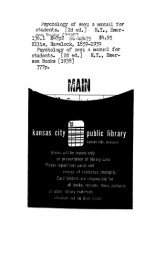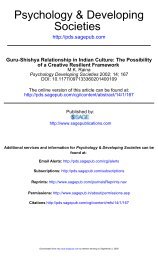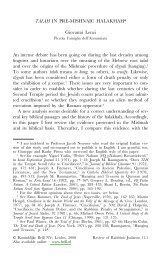Religion, Theology, and Philosophy on the Way to Being and Time ...
Religion, Theology, and Philosophy on the Way to Being and Time ...
Religion, Theology, and Philosophy on the Way to Being and Time ...
Create successful ePaper yourself
Turn your PDF publications into a flip-book with our unique Google optimized e-Paper software.
I. M. Fehér / Research in Phenomenology 39 (2009) 99–131 117<br />
prohibitive character inherent in it: everything “off ered <strong>to</strong> us in ‘intuiti<strong>on</strong>’ is<br />
<strong>to</strong> be accepted . . ., but . . . <strong>on</strong>ly within <strong>the</strong> limits in which it is presented <strong>the</strong>re.”<br />
Th e term ‘descripti<strong>on</strong>’ has, in phenomenology, Heidegger argues in <strong>Being</strong> <str<strong>on</strong>g>and</str<strong>on</strong>g><br />
<strong>Time</strong>, “a sense of a prohibiti<strong>on</strong>—<strong>the</strong> avoidance of characterizing anything<br />
without . . . dem<strong>on</strong>strati<strong>on</strong>.” 46 In full accordance with this principle, he claims<br />
fur<strong>the</strong>r in <strong>the</strong> work that his “analysis of death remains purely ‘this-worldly’ ”<br />
<str<strong>on</strong>g>and</str<strong>on</strong>g> that accordingly it decides nothing (ei<strong>the</strong>r positive or negative) about <strong>the</strong><br />
‘o<strong>the</strong>r-worldly.’ Moreover, it even remains undecided whe<strong>the</strong>r any questi<strong>on</strong><br />
c<strong>on</strong>cerning what comes after death can, as a “<strong>the</strong>oretical” (that is, as a phenomenologically<br />
meaningful philosophical) questi<strong>on</strong>, ever be formulated at all. 47<br />
It is worth quoting Heidegger in more detail: “our analysis of death remains<br />
purely ‘this-worldly’ in so far as it interprets that phenomen<strong>on</strong> merely in <strong>the</strong><br />
way in which it enters in<strong>to</strong> any particular Dasein as a possibility of its being.” 48<br />
(“<strong>Being</strong>” should be read here, in terms of his c<strong>on</strong>ceptuality of <strong>the</strong> early twenties,<br />
as “factical <strong>Being</strong>,” “facticity.”) Now we should realize that his approach<br />
<strong>to</strong> religi<strong>on</strong> in <strong>the</strong> early twenties is quite analogous; his c<strong>on</strong>cern is with (<strong>the</strong><br />
phenomenological descripti<strong>on</strong> of) how faith is factically being lived, with<br />
<strong>on</strong>e’s becoming (having become) <str<strong>on</strong>g>and</str<strong>on</strong>g> remaining (becoming again <str<strong>on</strong>g>and</str<strong>on</strong>g> again) a<br />
believer; in short, how <strong>on</strong>e in fact lives <strong>on</strong>e’s faith (whereby faith is a possibility<br />
of <strong>on</strong>e’s factical being). Th e way <strong>on</strong>e does this coincides with <strong>the</strong> way <strong>on</strong>e<br />
lives. Living <strong>the</strong> faith is in no ways separable from living life. By acknowledging<br />
this we are brought back <strong>to</strong> <strong>the</strong> fi rst point, namely, that religi<strong>on</strong> is, fi rst <str<strong>on</strong>g>and</str<strong>on</strong>g><br />
foremost, a matter of praxis, living enactment, ra<strong>the</strong>r than <strong>the</strong>ory or doctrine.<br />
Indeed faith as practical enactment remains forever <strong>the</strong> fundament of <strong>the</strong>ology<br />
49 (more <strong>on</strong> this later).<br />
But <strong>to</strong> justify <strong>the</strong> claim that religi<strong>on</strong> is primarily religious life is not <strong>to</strong> justify<br />
<strong>the</strong> claim that it is a paradigm of life. So it is still not clear why, in precisely<br />
what sense, religious life is a paradigm of life—why, in o<strong>the</strong>r words, religious<br />
life (characteristic of, <str<strong>on</strong>g>and</str<strong>on</strong>g> as experienced in, primal Christianity) provides us<br />
with <strong>the</strong> key—or, more terminologically put, with a phenomenological access—<br />
<strong>to</strong> factical life, or factical life experience; why, as Heideggger states, Christian<br />
religiosity not <strong>on</strong>ly lies (is rooted or grounded or <strong>to</strong> be found) in factical life<br />
46) SZ 35 (“Fernhaltung alles nicht ausweisenden Bestimmens”) / BT 59.<br />
47) SZ 248 / BT 292.<br />
48) SZ 248 / BT 292. Also something such as a “ ‘metaphysics of death’ lies outside <strong>the</strong> domain<br />
of an existential analysis of death” (ibid.).<br />
49) See, for example, GA 60: 95, 145, 310; GA 9: 55, 59, 61; SZ 10.







